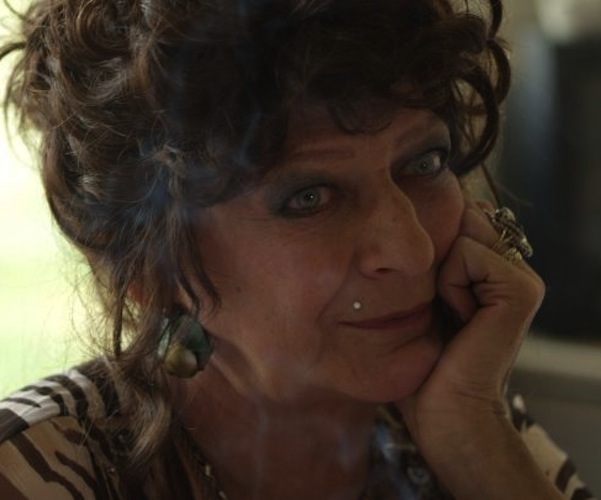Film Review: Boston MFA French Film Festival — “Party Girl,” Gray Panther Division
Party Girl has won a plethora of festival awards, including two at Cannes in 2014.
Party Girl written and directed by Claire Burger, Marie Amachoukeli, and Samuel Theis. Playing at the Museum of Fine Arts Boston as part of its French Film Festival on July 24 at 4:30 p.m. and on July 25 at 1 p.m.

Angelique in a scene from “Party Girl.”
By Paul Dervis
The Museum of Fine Arts goes into the last weekend of the 20th Annual French Festival with a very unusual film, Party Girl. It’s not quite a documentary, but neither is it a conventional feature film. Let’s call it a hybrid of the two.
And it is a family affair.
With three different directors working on this project and amateur actors playing themselves, Party Girl has a ‘real life’ quality that we haven’t seen since Robert Duvall gave us Angelo, My Love. In that film, Duvall cast real gypsies who constructed fictionalized images of their own lives, with the precocious child Angelo Evans driving the tale.
What that film has going for it that Party Girl is missing, however, is a talented and experienced artist at the helm. (One of the directors is the son of the lead.) Duvall made sure that the narrative never went off the rails; he was constantly moving the storyline forward, keeping the ever-theatening mundane at bay. Party Girl was also clearly improvised but suffers from redundant scenes.
But it is not without its own compelling charm; the film has won a plethora of festival awards, including two at Cannes in 2014
Party Girl follows aging cabaret hostess Angelique Litzenburger, (playing herself) as she grudgingly gives up her questionable nightlife world to marry one of her admirers from the club. Michel, played by Joseph Bour in his first film role, is a retired mine worker who frequented the establishment to, as Simon and Garfunkel would say, “find some comfort there.”
But Angelique, who is very much at home rubbing elbows in a smoke-filled lounge among a bevy of comely pole dancers, is desperately uncomfortable in the ordinary world of domesticity. Going to bed with Michel is a lot different than going to bed with Michel had been in the old days — if you get my drift.
And her family, including masses of children and grandchildren (and they are the actress’ real brood), scoff at her metamorphosis. Of course, some relatives have simply stopped talking to her. Those who maintain a connection tease and taunt her, but their affection is clear.
Where Angelique runs into real trouble, is, well, she can’t abandon her flirtatious ways. This becomes a serious issue with Michel. It’s oh so ironic that he wants to shut down the playful eroticism that attracted him to her in the first place. Or maybe it’s not ironic at all.
She also has to reconnect with her youngest. A girl she last saw a decade earlier and lost to foster parents because of her promiscuous lifestyle. With the wedding coming up, and at the urging of her other children, Angelique knows it is time for a reunion with the child, who is now a teenager.
Though its made-up-on-the-spot dialogue is haphazard at best, the film is beautifully photographed. Set in a French town that hugs the German border, the streets change from drab in daylight to fanciful at night, and the cabaret scenes are intoxicating…which Angelique often is as well.
An argument can be made that this is a feminist film. A sixty year old woman refuses to conform to what society expects. She dresses provocatively and wears much too much make up. However, the feisty character would most likely laugh at any attempt to pigeonhole her and her way of living her life her way. She merely wants to continue to do what she has done all along — the rest of us be damned!
After all, this senior citizen is just a fun lovin’ party girl.
Paul Dervis has been teaching drama in Canada at Algonquin College as well as the theatre conservatory Ottawa School of Speech & Drama for the past 15 years. Previously he ran theatre companies in Boston, New York, and Montreal. He has directed over 150 stage productions, receiving two dozen awards for his work. Paul has also directed six films, the most recent being 2011’s The Righteous Tithe.
Tagged: Boston Museum of Fine Arts Film, Claire Burger, French Film Festival, Marie Amachoukeli, Party Girl, and Samuel Theis

